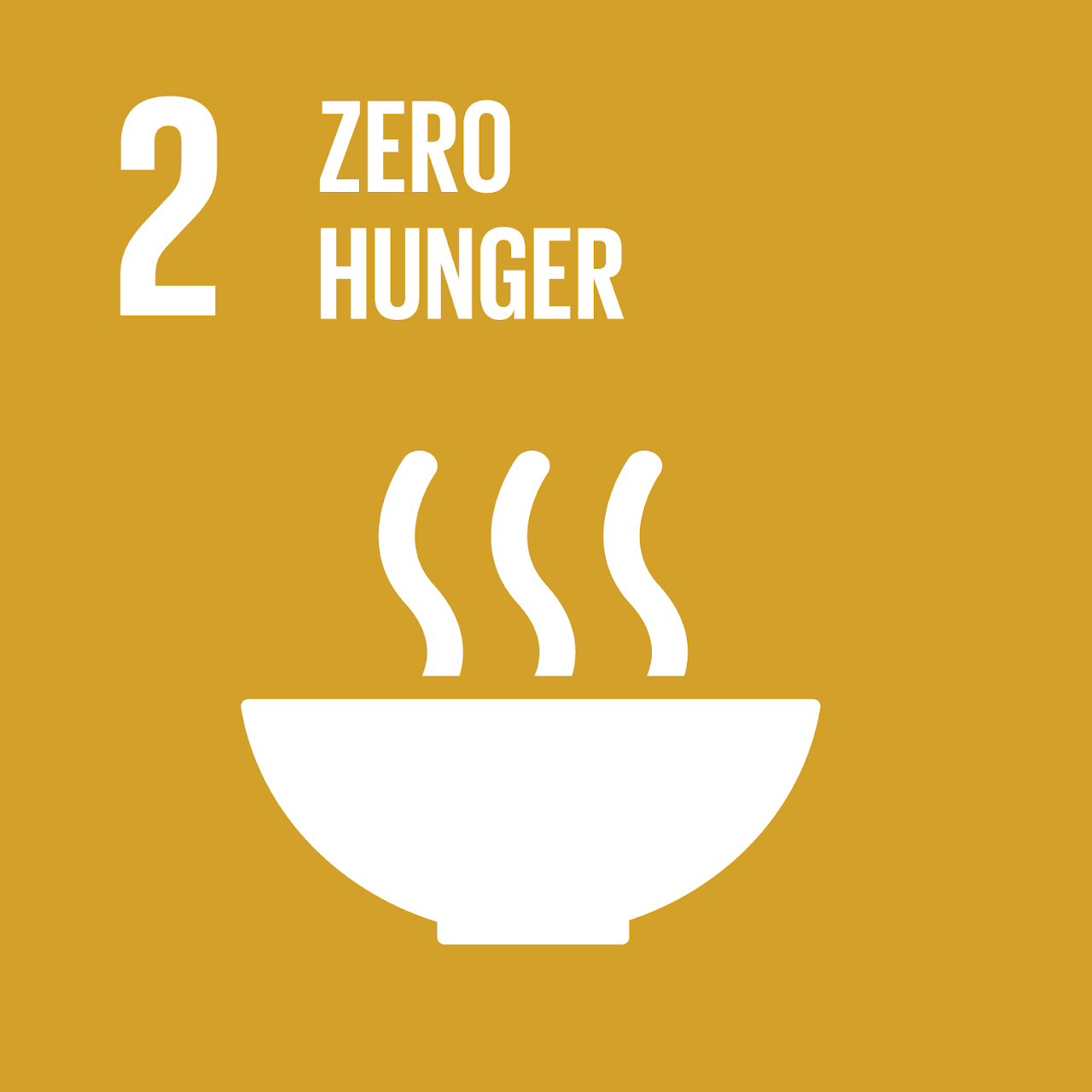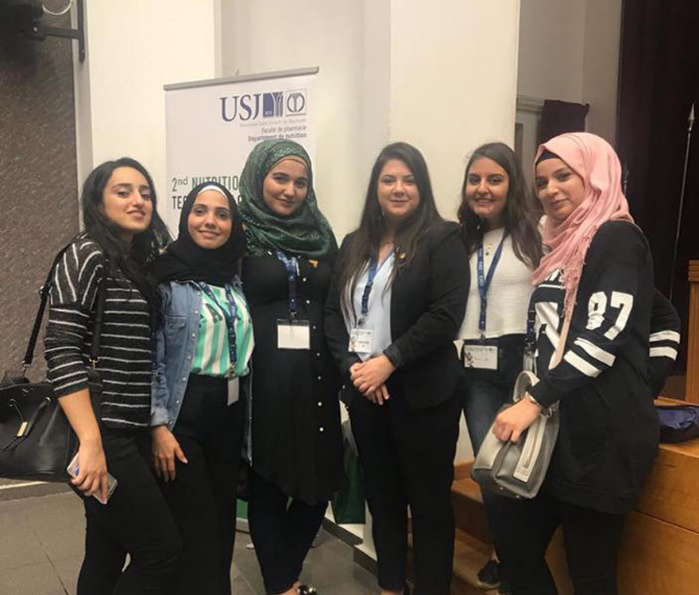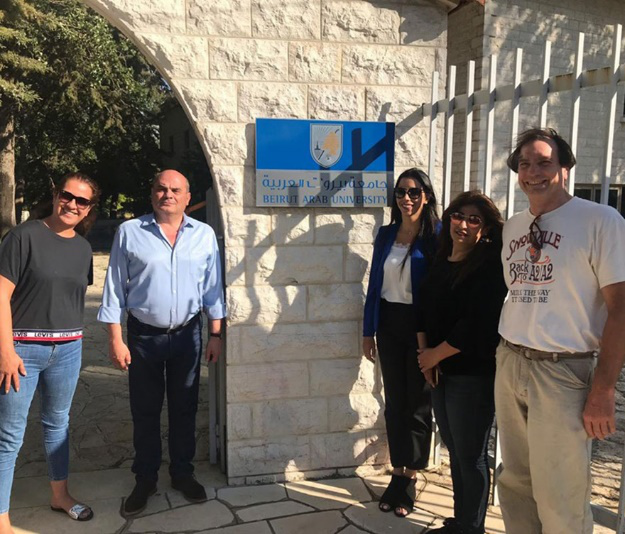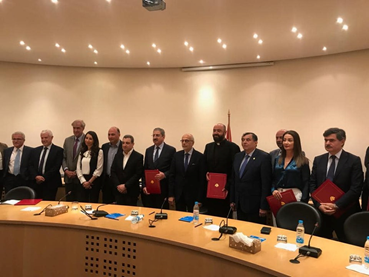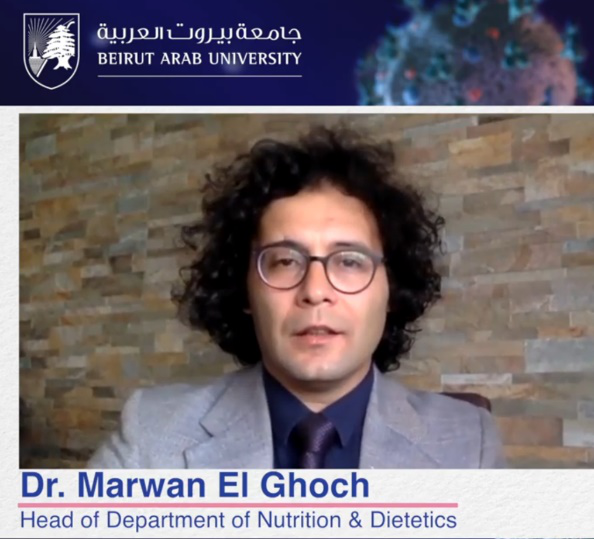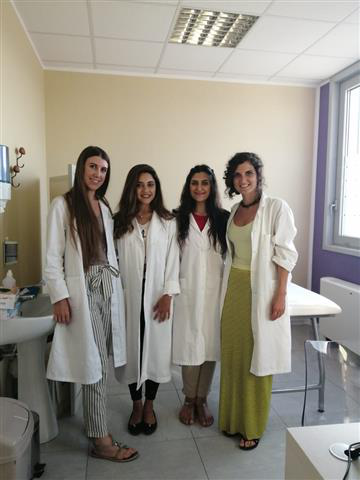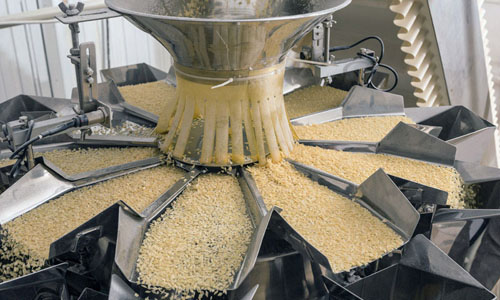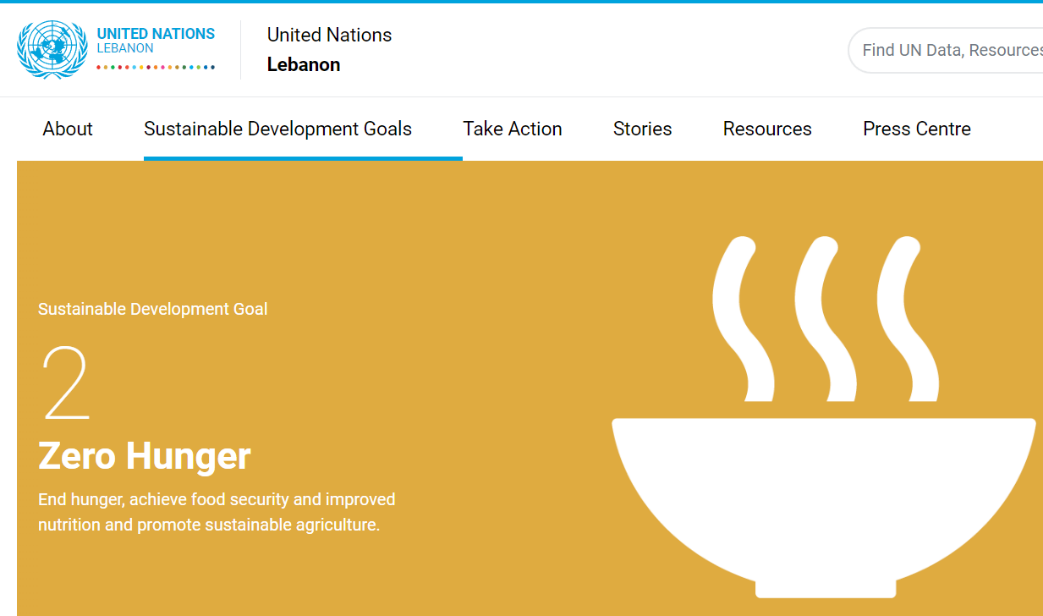SDG 2: ZERO HUNGER
University Relevant Events
Ms. Dima Kreydieh and Mrs. Hana El Tannir actively participated as moderators in the Second Conference of Nutrition & Food Technology that was held on October 25 & 26 2018 at the Medical Sciences Campus, USJ.
Ms. Kreidieh participated in the first session entitled ‘Mediterranean Diet’ where several topics were held including the ‘Assessment and comparison of five international tools measuring the adherence to the Mediterranean Diet’, ‘Mediterranean vs Western breakfasts: impact on satiety’ and ‘Cognitive function in elderly: role of nutrition’.
Whereas Mrs. Hana El Tannir participated in the session entitled ‘Functional Ingredients and Waste Management’ covering several topics including ‘Triticum durum: an interesting novel functional ingredient in bread making’, ‘Available data on the implementation of sensory evaluation of food in Lebanese industries’, ‘Survey study on the waste and by-products generated by agro-food industries in Lebanon’ and ‘Treatment and valorization of olive oil mill waste water in Lebanon’.
The Center of Continuing and Professional Education (CCPE) at BAU in collaboration with the USAID funded Farmer-to-Farmer Food Safety and Quality program (F2F FSQ) implemented by Land O’Lakes ID, hosted a training for BAU students from the Faculty of Health Sciences on Organic Farming, rules, and production practices; In addition to compost making and its importance in agriculture.
The training session was delivered by Mr. Eric Pawlowski, an Organic Farming Specialist who conducted also a field visit with Dr. Nada El Darra, the Associate Professor of Food Safety and Technology at the Faculty of Health Sciences to the Research Center for Environment and Development at Beirut Arab University at the Bekaa Region whereby he checked the center’s facilities and production fields, and provided suggestions for possible organic production areas and marketing options.
BAU President Professor Amr Galal El-Adawi, together with the Minister of Industry H.E. Wael Abou Faour as well as eight Lebanese university presidents and representatives of presidents, signed an MoU that aims to "involve university students, after their training, in periodic inspection of industrial institutions as related to the application of basic food safety standards by collecting data that covers all stages of production, starting with raw materials to the final product, to ensure that the requirements for the safety of food production are met before being put on the market.
The owners of the institutions shall get the "Stamp of Quality" from the ministry, granting industrial enterprises more credibility and helping them market and promote their products.”
The event was attended by Minister of Education and Higher Education Akram Chehayeb, Director General of the Ministry of Industry Dany Geadeon, representatives of the Association of Lebanese Industrialists and Syndicate of Lebanese Food Industries, university presidents and representatives of presidents, in addition to Beirut Arab University, Lebanese University, American University of Beirut, Lebanese American University, Holly Spirit University, Saint Joseph University, Notre Dame University, Louaize and University of Balamand.
The entire globe is under the grip of an aggressive pandemic due to COVID-19. In this scenario, in the last few weeks many theories on the preventive and curative capacity of specific diets and some food as well as vitamin and minerals supplementations, in relation to COVID-19 have been pumped out on popular social media platforms, with many revealed not to be sufficiently supported by evidence.
For this reason as Department of Nutrition and Dietetic at Beirut Arab University in collaboration with the University of Brescia (Italy) we recently published a position statement to clarify the real role of nutrition during COVID-19 pandemic.
We think that nothing exceptional or different in relation to diet should be adopted during the COVID-19 pandemic that was not valid before. Therefore A healthy lifestyle based on our Mediterranean diet with.
High intakes of legumes, vegetables, fresh fruits, whole grains, nuts and olive oil.
Moderate intake of fish, poultry, eggs, and dairy products.
Low intakes of red and processed meat, refined carbohydrates and sweets.
Through the OVERSEAS agreement between Beirut Arab University (Lebanon) and University of Pavia (Italy), two students - Ms Dana El Masri and Leila Chehade - from the “Master of Science in Nutrition” program visited Pavia from 17th to the 27th of July 2019.
During this period, the two students have been actively involved in some clinical and research activities in the Dietetics and Clinical Nutrition Laboratory at the Department of Public Health, Experimental and Forensic Medicine (University of Pavia).
Specifically as research activity, the two students worked with their Italian colleagues on the International project entitled “Sustainable Agrifood System Strategies (SASS)” conducted in Africa (Tanzania).
On the other hand, as clinical activity, the Master students attended the outpatient clinic and participated in weekly meetings that aimed to discuss some clinical cases.
University/Strategy/Policy/Procedure
Food processing losses and waste are becoming increasingly alarming worldwide. They take place at different stages of the food supply chain. Valorization of food waste sources is therefore becoming of a prime interest owing to environmental and economic values. Different extraction techniques can be used for polyphenols recovery of the food by-products.
The most common applicable technique of extracting phenolic compounds from plant materials remains the solid/liquid extraction. However, the massive use of organic solvents represents a significant cost for industry and is not recommended due to their negative impact on human health.
The exploration of new Green and GRAS (Generally Recognized as safe) techniques is becoming crucial to enhance polyphenols extraction. Recently, many important investments are put into technology and in the application of different procedures that are intended to weaken the cell walls and enhance the extraction of phenolic compounds.
The application of novel electro technology’s such as pulsed electric field, ultrasound and microwave-assisted extraction might be alternative, environmentally friendly and energy-saving techniques to valorize the contents of by-products.
Our main research projects consist of elucidating the role of different emerging techniques in extracting bioactive compounds, mainly polyphenols. Our team, at the department of nutrition, investigates different extraction techniques (Ultrasound, microwave assisted extraction, pulsed electric field, thermal treatment and infrared) for their effects on recycling the polyphenols of fruit pomace.
The comparison of the efficiencies of polyphenols extraction using β-cyclodextrin, aqueous and organic solvents for fruit pomace is also studied.
The assessment of the biological properties (antiradical, antimicrobial and cytotoxicity) of the polyphenols extracted is performed as well. Future research projects will focus on investigating new technologies for spices and herbs sterilization and developing a viable decontamination system suitable for adoption in the Lebanese spices industry.
Other projects will apply new assays for the detection of antibiotics residues in cow's milk and some traditional Lebanese dairy products. Screening of frequently occurring mycotoxins in some Lebanese spices will be also studied.
Access to quality and nutritious food is fundamental to human existence. Food security produces a wide range of positive impacts such as economic growth and poverty reduction, and has an important foreign policy dimension due to trade. According to the Food and Agriculture Organization (FAO), Lebanon imports 87% of its total food supply.
Therefore, securing sustainable sources of food is a matter of national security. The Food Security Office was established in 2017 to help the Lebanon achieve its vision of becoming a leader in innovation-driven food security by utilizing technologies that can limit greenhouse gas emissions, water use and waste whilst guaranteeing the health of the consumer.
Policies and Initiatives
Lebanon Future with Food, is a cultural movement by kids-for-kids to help raise awareness on how food is produced to teach children about food sustainability. Implementation of the movement commenced in 2019.
The National Future Food Security Strategy (2018) includes 38 short and long-term initiatives within the 2021 and 2051 Lebanon Vision. The strategy includes five strategic objectives to facilitate food trade, diversify food import sources and identify alternative supply schemes.
Agricultural Technology Adaptation Accelerator Program (AgTech) 2018 is an initiative to foster the adoption of sustainable technologies to promote agriculture in marginal environments through an interactive platform. The aim is to establish an agricultural business environment that supports the Lebanon water and food security.
Food Valley Platform is a unified platform to document all relevant research and critical information to researchers that will help boost research and development (R&D) in that sector. The platform is under development and will include information such as R&D papers, funding sources, and a patent management process .
